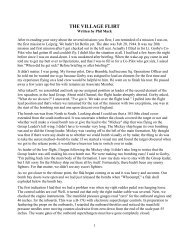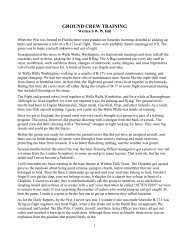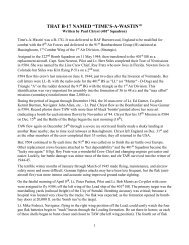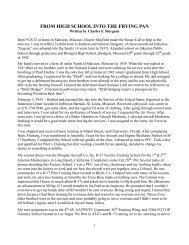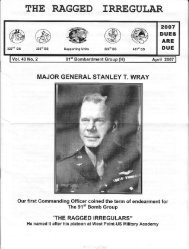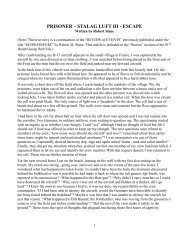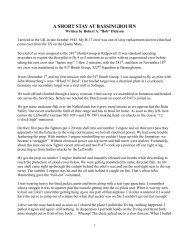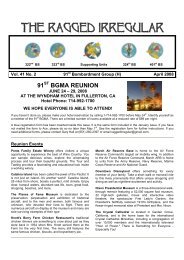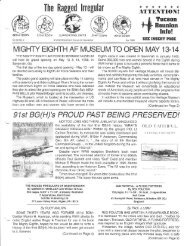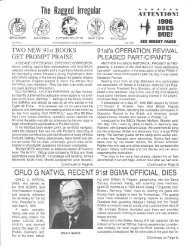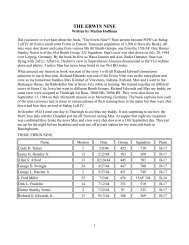Dailies of the 323rd - the 91st Bomb Group!
Dailies of the 323rd - the 91st Bomb Group!
Dailies of the 323rd - the 91st Bomb Group!
Create successful ePaper yourself
Turn your PDF publications into a flip-book with our unique Google optimized e-Paper software.
Lt. Kolts. Lt.'s Ward and Kolts, later left Major Bishop to put<br />
on <strong>the</strong> show alone on ship #639 "Careful Virgin". He came so low<br />
<strong>the</strong> first time that <strong>the</strong> men on <strong>the</strong> ground thought <strong>of</strong> falling for<br />
cover. Next time, <strong>the</strong>y started for cover, and <strong>the</strong> third time <strong>the</strong>y<br />
fled, supposedly praying as <strong>the</strong>y went. That ship came so low that<br />
a man standing up would have fallen flat, ei<strong>the</strong>r for his own<br />
safety or for fright. Photographers were on hand taking pictures<br />
<strong>of</strong> <strong>the</strong> "buzz job" and afterwards <strong>the</strong>y showed just what a job it<br />
was. They say that Captain Gladstone, himself, was getting<br />
scared, but Major Bishop just kept getting lower and lower.<br />
Finally, he came in and landed. Col. Putnam brought him up to <strong>the</strong><br />
water wagon and <strong>the</strong> ducking was definitely begun. M/Sgt.<br />
Lea<strong>the</strong>rs, a Crew Chief, seemed to have been ducked himself,<br />
having been caught by a hose that was also in very much use.<br />
For two men to be so handled upon completion <strong>of</strong> a tour <strong>of</strong> twentyfive<br />
missions, to be manhandled and ducked into a tub <strong>of</strong> water<br />
and o<strong>the</strong>rwise tossed about might seem to <strong>the</strong> more "Pius" person,<br />
a cruel way <strong>of</strong> doing things that is, <strong>of</strong> expression <strong>of</strong> our good<br />
feeling toward <strong>the</strong>m. Well, that is how it was done. For <strong>the</strong>m, it<br />
was not all bad. The individual, with something under his coat,<br />
promptly came forward and handed <strong>the</strong>m a long quart bottle <strong>of</strong><br />
spirits to revive <strong>the</strong>m. After that, it was all over. Both<br />
<strong>of</strong>ficers and enlisted men felt proud <strong>of</strong> <strong>the</strong>m and relieved <strong>of</strong><br />
<strong>the</strong>ir having completed <strong>the</strong>ir tour so successfully. Wherever <strong>the</strong>y<br />
go, afterward, <strong>the</strong> good wishes <strong>of</strong> this squadron go with <strong>the</strong>m.<br />
22 Jan. 1944: Upon Major Bishop being relieved as Squadron<br />
Commander, Major James F. Berry assumed command on January 22,<br />
1944. With his background <strong>of</strong> training and experience, he is<br />
eminently well qualified for <strong>the</strong> position, and <strong>the</strong> squadron feels<br />
lucky in having him as its leader. 1/Lt. Albert R. Koehl had been<br />
serving as assistant operations <strong>of</strong>ficer for several months. So he<br />
carried on as Operations Officer in lieu <strong>of</strong> Captain Gladstone,<br />
being relieved. It is <strong>the</strong> policy to relieve flying <strong>of</strong>ficers from<br />
duty with <strong>the</strong>ir organization upon <strong>the</strong>ir completion <strong>of</strong> twenty-five<br />
operational missions; so Major Bishop and Captain Gladstone were replaced.<br />
23 - 24 Jan. 1944: From <strong>the</strong> twenty-second to <strong>the</strong> twenty-fourth <strong>of</strong><br />
January, ground school and o<strong>the</strong>r training activities were engaged<br />
in. On <strong>the</strong> 24th <strong>the</strong>re was a practice mission. It was made up <strong>of</strong><br />
six <strong>of</strong> <strong>the</strong> least experienced crews. They were briefed and handled<br />
just as if going on a real mission. It was at high altitude. Each<br />
crewmember was at his assigned position and instructed to do his<br />
work just <strong>the</strong> same as on <strong>the</strong> real thing. Such missions are <strong>of</strong><br />
especial value to <strong>the</strong> pilots, co-pilots, bombardiers and<br />
navigators. With experiences leaders to check <strong>the</strong>m on <strong>the</strong>ir weak<br />
points, <strong>the</strong>y learn to do well in practice what is so necessary to




